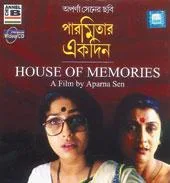Meghe Dhaka Tara (The Cloud-Clapped Star, Bengali, 1960)
Screenplay & Direction: Ritwik Ghatak
 I saw him brought in earlier in handcuffs and was attended to by my seniors. I noticed that everyone was looking at him with judgemental looks. So as not to embarrass him further, I just immersed myself in work. Still, from the corners of my eye, I did notice that he looked too intelligent to be wearing prison attire and be shoved around like a common criminal.
I saw him brought in earlier in handcuffs and was attended to by my seniors. I noticed that everyone was looking at him with judgemental looks. So as not to embarrass him further, I just immersed myself in work. Still, from the corners of my eye, I did notice that he looked too intelligent to be wearing prison attire and be shoved around like a common criminal.
He must have seen me clerking the patients all through the afternoon, and there I was, still attending to patients at 10pm, as the first frontliner and the most junior of the staff. I must have looked gullible enough for him to quietly signal me to come beside him as I passed him by.
.
So, when he called me, I was curious. He complained he had chest pains that could be a heart attack and needed a certification letter that he had a massive myocardial infarction. I was scratching my head. At most, he could be having some musculoskeletal discomfort. His symptoms and ECG suggested that the possibility of a full-blown cardiac event was remote. I told him, "I will see what I can do", and never went in his direction again.
I later found out he was a senior lawyer charged with a criminal breach of trust suit and was scheduled to appear in courts the following day, hence the delay tactic. And, I was the sucker to be used for his personal intent.
For a long time, I was annoyed by the event. There I was, squeezing my brains trying to sort out the best treatment for the ill patients, and someone out there was one-minded to get me into trouble and sweet talk me for his nefarious intentions.
As the years went on, I soon realised that nobody actually gives anyone a damn. At the end of the day, it is all about self-sustenance and personal gratification. If I were working through lunch that day because I thought the patients needed more urgent attention than my suppressible hunger, it is no fault of the patients. It was mine for not prioritising and lack of foresightedness. As if these things are predictable? I chose my line of duty. I thought it was my calling, so stop whining. I am just a mere spoke in the wheel of human civilisation. And the direction of the human march is forward, and I am the lubrication to ensure smooth motion. Nobody is worried that the lubricant dries up or gets denatured. It is what it is.

Khuki's family is a refugee family affected by the Partition. The family is probably from the Bhadralok class of society who benefitted from the British Rule acquiring Western education and 'cultured' behaviour. All that came to nought overnight as they were deprived of homes and possessions after the bloody feud for statehood. So this middle-upper echelon of East Bengal spilt over westwardly for survival.
Khuki's father is an old school teacher who could recite Keats and Shakespeare at the drop of a hat, becomes debilitated after a fall. The responsibility of caring for the family falls on Khuki. She has ambitions of higher education and marriage to the love of her life, Sanat.

Khuki's mother is forever complaining of increasing expenses for the household. The eldest son of the family, Shankar, is only interested in being a world-class singer. Till then, he was not planning to do any other work. A younger brother, Mantu, is a keen sportsman. The youngest, Gita, is a dreamy young girl interested in staying pretty and not in her studies.
Khuki sacrifices all desires for the well being of the family. She surrenders her salary, gives up her comfort and even gives up her man to be married off to her sister. What she gets in return is just more demands and contempt. All the stresses did not augur well for Khuki.

.jpeg)































